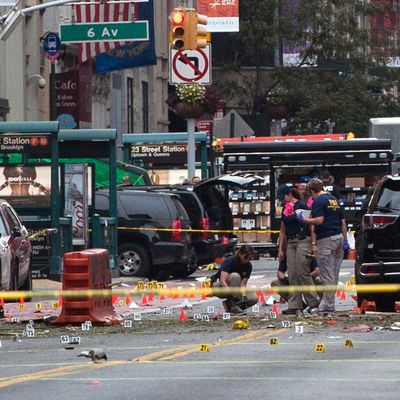
The bomb that went off in New York this weekend, along with signs of a possible connection to broader terrorist plans, immediately called to mind long-standing concerns that a “black swan” event — something big and mind-bending that was not factored into the campaign’s trajectory — shortly before the 2016 general election might skew the results. Most discussion of black-swan events is based on the assumption that they would help Donald Trump; indeed, Trump himself is often viewed as a black swan, and his possible election as a globally destabilizing event.
But New York Times columnist Ross Douthat might have gotten it right back in May when he suggested that Trump would most benefit from less-catastrophic occurrences:
I don’t think it’s a simple case of “the worse the blow, the better for Trump.” The Man From Mar-a-Lago is many things, but he isn’t a reassuring figure or a steady hand, and the prospect of putting him in charge in the midst of an enormous national security crisis might give many undecided voters pause.
What Trump benefits most from, I suspect, is a more limited sense that things are out of control — a feeling of anxiety about the world that pulses through your TV set or your computer screen but hasn’t yet hit your neighborhood or family or bank account directly.
Thus the terrorist attacks in Paris and San Bernardino, Calif., and the entire Syrian refugee crisis were ideal for Trump’s appeal, contributing to a sense that “there’s something going on, and it’s bad” (as he put it) without clarifying the stakes involved for the United States or the kind of response that a President Trump might actually be charged with undertaking.
If the current bombing and bombing threats represent the first incidents in a massive wave of terrorist activity, it could rise to the level of a national-security crisis that would unite the public behind the current commander-in-chief (and indirectly, his intended heir) while making hypothetical concerns about Trump’s experience and stability extremely concrete and relevant.
But if instead we are witnessing another San Bernardino–style event — deadly enough to command sustained national attention but more a reminder of the catastrophic possibilities than a realization of them — that could really help Trump by diverting attention from the messaging that Hillary Clinton is beginning to convey via a large advantage in paid communications capacity, while reinforcing the Republican’s own meta-message that foreigners and their domestic “agents” are all but taking over the country.
If, for example, the first presidential debate on September 26 focuses disproportionately on terrorism, it would complicate Hillary Clinton’s efforts to depict Trump’s intolerance of immigrants and Muslims as un-American. It would also give Trump the strategic flexibility to either double-down on his semi-hysterical rhetoric linking terrorism to immigration and globalization, or to appear statesmanlike in a tempered approach to ethnic and religious profiling or overseas military strikes.
To put it most simply, catastrophic terrorist events might be sobering to Americans; less catastrophic events could simply frighten or enrage them. There are a lot of imponderables about this strange year of decisions for U.S. voters, but the one thing we know for sure is that fear and rage are Donald’s Trump’s friends.






























